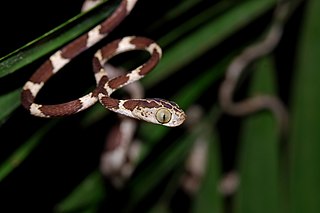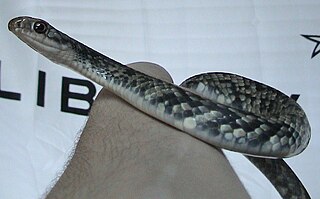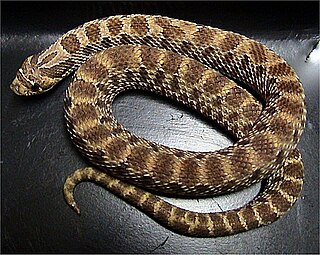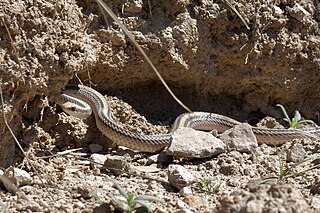
The smooth green snake is a species of North American nonvenomous snake in the family Colubridae. The species is also referred to as the grass snake. It is a slender, "small medium" snake that measures 36–51 cm (14–20 in) as an adult. It gets its common name from its smooth dorsal scales, as opposed to the rough green snake, which has keeled dorsal scales. The smooth green snake is found in marshes, meadows, open woods, and along stream edges, and is native to regions of Canada, the United States, and northern Mexico. A non-aggressive snake, it seldom bites and usually flees when threatened. It mates in late spring to summer, and females lay their eggs from June to September. The smooth green snake will often bob its head in order to mimic vegetation blowing in the wind.
Atractus trilineatus, commonly known as the three-lined ground snake, is a species of small burrowing snake in the family Colubridae. The species is native to South America.

Imantodes cenchoa, also known commonly as the blunthead tree snake, the neotropical blunt-headed tree snake, and the fiddle-string snake, is a species of mildly venomous, rear-fanged snake in the family Colubridae. The species is native to Mexico, Central America, and South America.

Rena humilis, known commonly as the western blind snake, the western slender blind snake, or the western threadsnake, is a species of snake in the family Leptotyphlopidae. The species is endemic to the southwestern United States and northern Mexico. Six subspecies are currently recognized, including the nominate subspecies described here.

Tropidoclonion is a genus of snake in the subfamily Natricinae of the family Colubridae. The genus is monotypic, containing the sole species Tropidoclonion lineatum, commonly known as the lined snake. The species is endemic to North America.

The long-nosed snake is a species of nonvenomous snake in the family Colubridae. The species is endemic to North America. It has two recognized subspecies. The other species in the genus were previously considered subspecies.

Cemophora coccinea, commonly known as the scarlet snake, is a species of nonvenomous snake in the family Colubridae. The species is native to the southeastern United States. There are two subspecies of C. coccinea that are recognized as being valid. The Texas scarlet snake was previously considered a subspecies.

The eastern racer, or North American racer, is a species of nonvenomous snake in the family Colubridae. The species is endemic to North America and Central America. Eleven subspecies, including the nominotypical subspecies, are recognized, which as a group are commonly referred to as the eastern racers. The species is monotypic in the genus Coluber.

Hypsiglena jani, commonly known as the Texas night snake or the Chihuahuan night snake, is a small species of mildly venomous snake in the subfamily Dipsadinae of the family Colubridae. The species is native to the southwestern United States and adjacent northeastern Mexico.

Coluber constrictor oaxaca, commonly known as the Mexican racer, is a nonvenomous colubrid snake, a subspecies of the eastern racer.

The western ground snake is a species of small, harmless colubrid snake. The species is endemic to North America. Its patterning and coloration can vary widely, even within the same geographic region. Another common name is miter snake referring to the head marking which suggests a bishop's miter; the synonym "episcopus " is a similar allusion.

The western hognose snake is a species of snake in the family Colubridae. The species is endemic to North America. There are three subspecies that are recognized as being valid, including the nominotypical subspecies.

Gyalopion canum, commonly known as the Western hooknose snake, is a species of small colubrid snake endemic to the deserts of the United States and Mexico. It is sometimes referred to as the Chihuahuan hook-nosed snake because it is commonly found in the Chihuahuan Desert.

Drymobius margaritiferus, commonly known as the speckled racer, is a species of nonvenomous colubrid snake native to the Americas. The specific name, margaritiferus, means "pearl-bearing" in Latin, referring to the pearl-like spots on the dorsal scales.

The sharp-tailed snake or sharptail snake is a small species of nonvenomous snake in the family Colubridae. The species is endemic to the Western United States and British Columbia.

The striped whipsnake is a species of nonvenomous snake in the family Colubridae. It is closely related to the California whipsnake. The striped whipsnake is native to the western United States and adjacent northern Mexico.

Salvadora hexalepis, the western patch-nosed snake, is a species of non-venomous colubrid snake, which is endemic to the southwestern United States and northern Mexico.

Leptophis diplotropis, commonly known as the Pacific Coast parrot snake, is a species of snake in the family Colubridae. The species is endemic to Mexico.

Micruroides is a genus of venomous coral snake in the family Elapidae. The genus is monotypic, containing only the species Micruroides euryxanthus.

Dipsadoboa aulica, commonly known as the marbled tree snake, is a species of snake in the family Colubridae. The species is endemic to Africa, and is mildly venomous to humans.


















